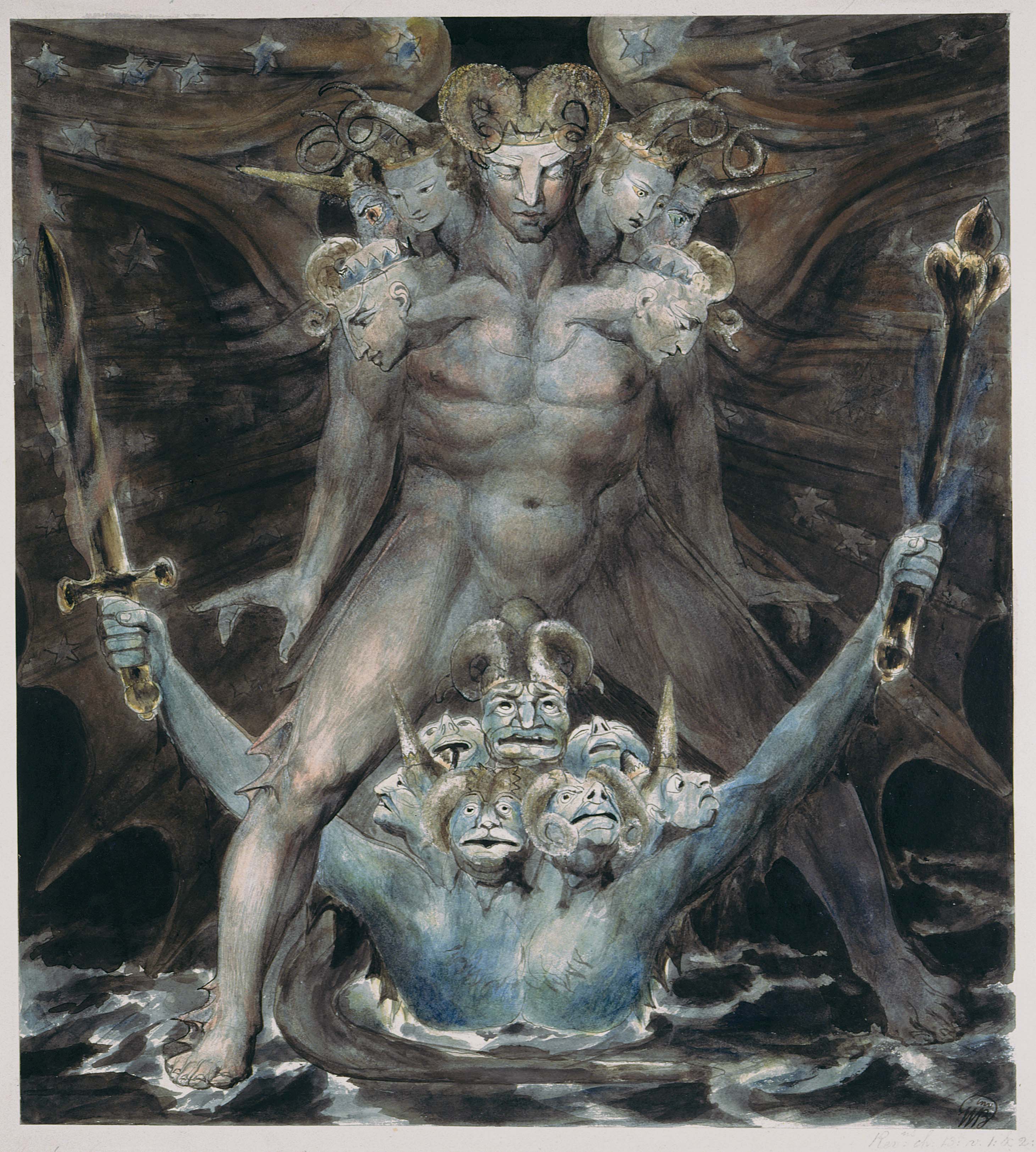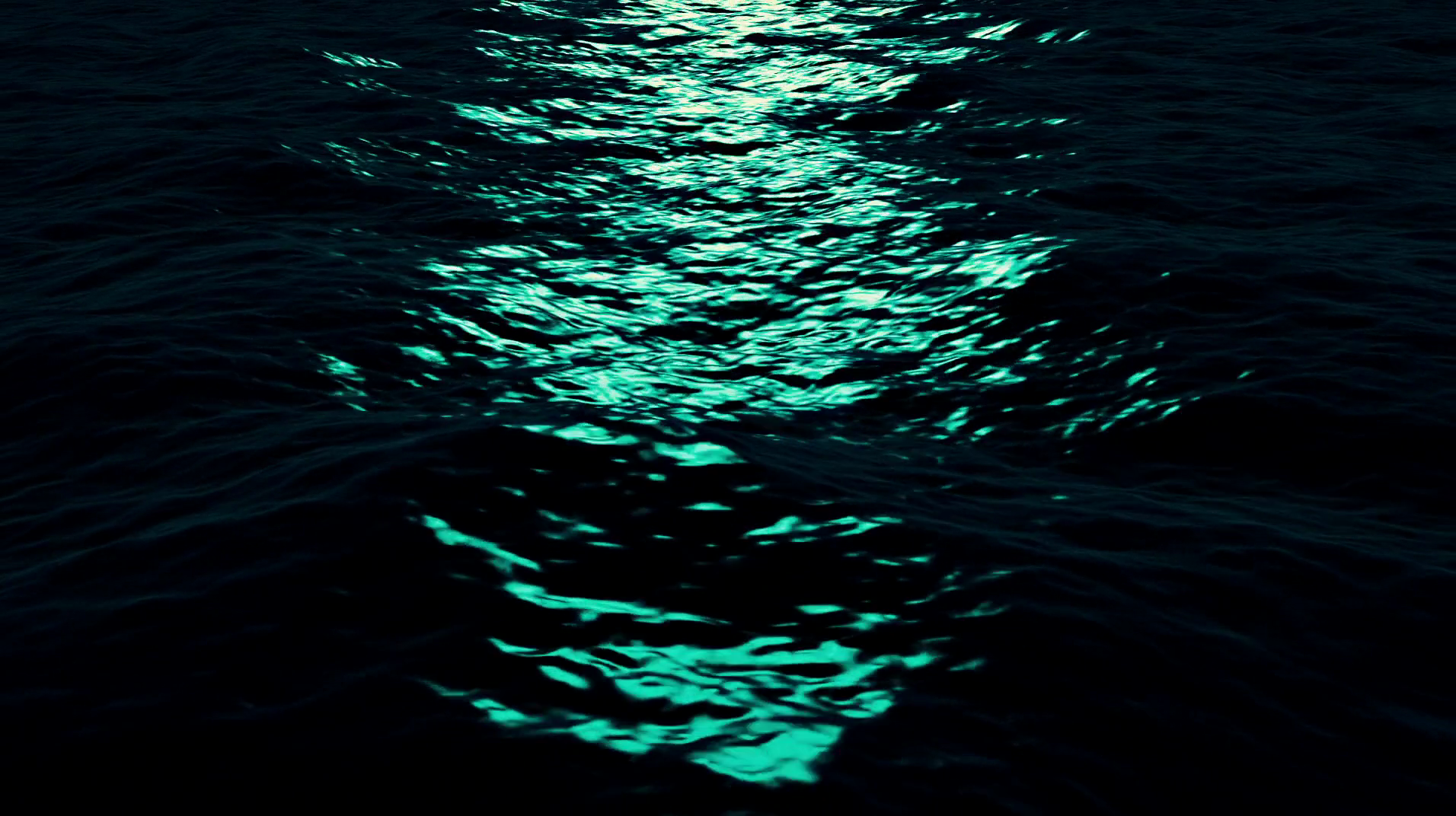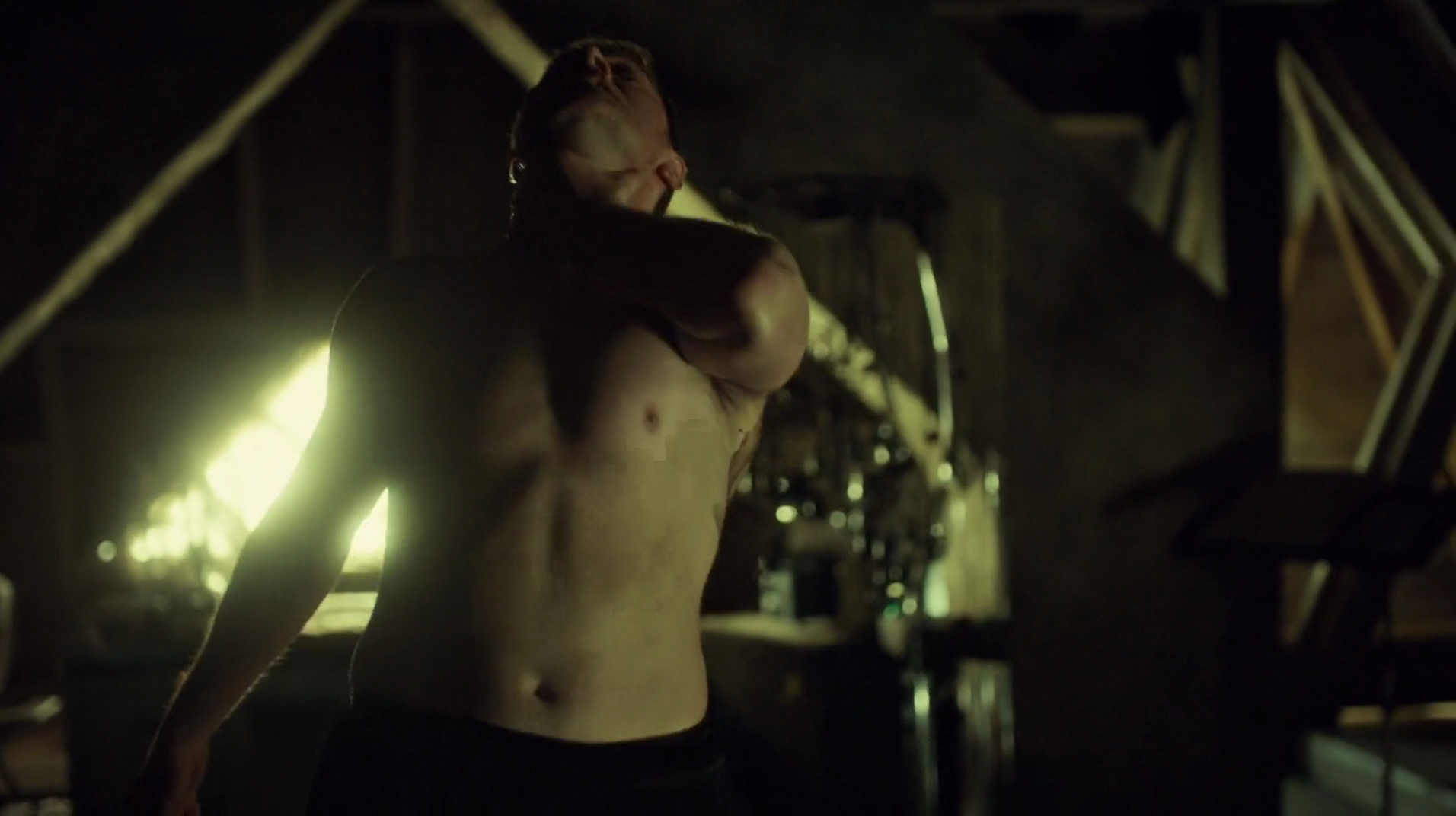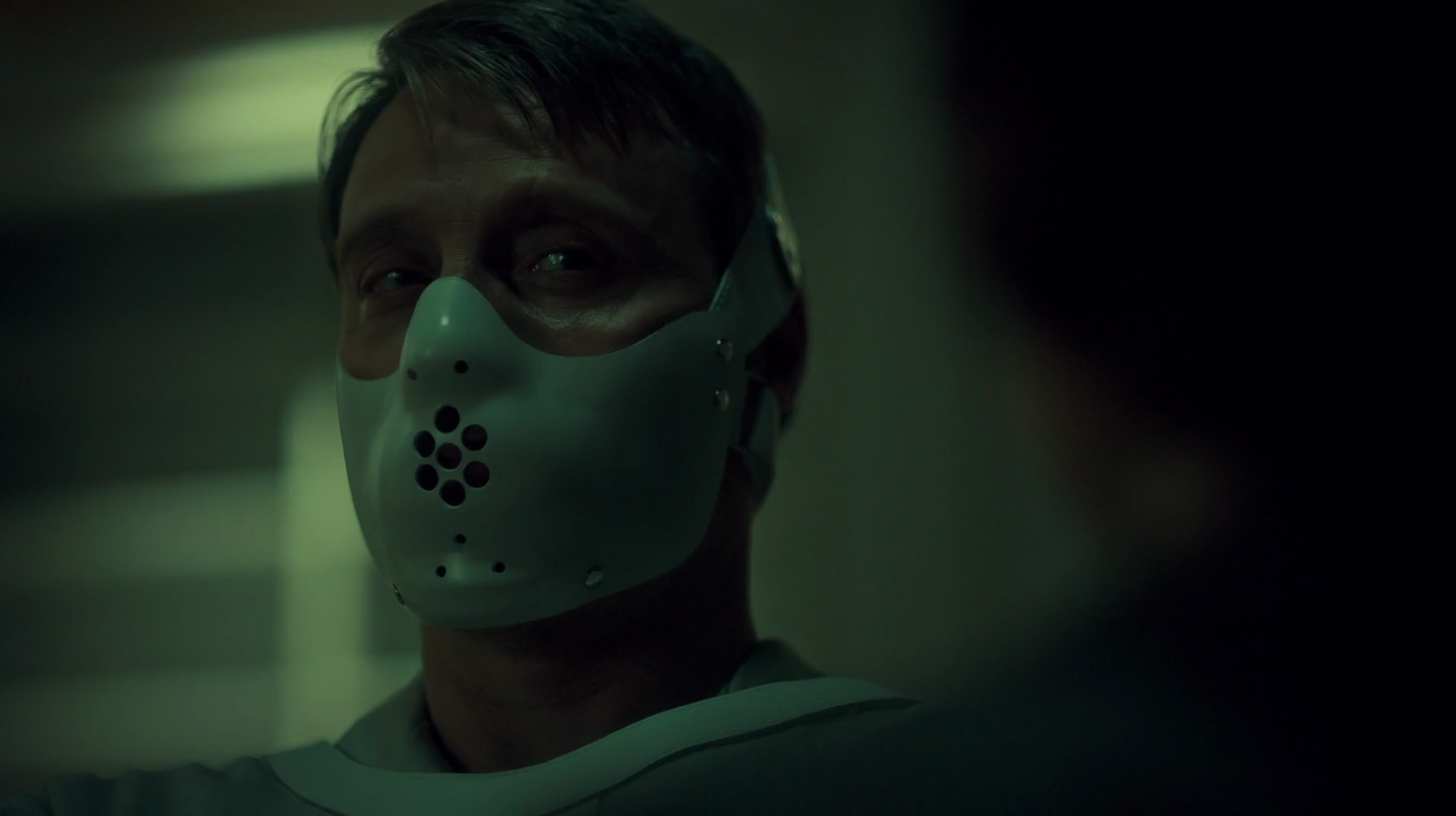The Proverbs of Hell 37/39: And the Beast from the Sea
 AND THE BEAST FROM THE SEA: The one painting in the series not to have a direct representation or invocation in the series. The tense sexuality that exists between the Dragon and the Sun-Clothed Woman is replaced here by a raw homoeroticism—a theme that is not entirely uncommon in Blake. (c.f. Object 47 of Milton a Poem) The Beast from the Sea appears in Revelation 13, one verse after the Dragon, and is said to be given his power by the Dragon, creating a sense of heritage or supplanting. In Blake, the Beast rises below the Dragon, but has clear dominion over him. Of course, that’s always how supplantation begins.
AND THE BEAST FROM THE SEA: The one painting in the series not to have a direct representation or invocation in the series. The tense sexuality that exists between the Dragon and the Sun-Clothed Woman is replaced here by a raw homoeroticism—a theme that is not entirely uncommon in Blake. (c.f. Object 47 of Milton a Poem) The Beast from the Sea appears in Revelation 13, one verse after the Dragon, and is said to be given his power by the Dragon, creating a sense of heritage or supplanting. In Blake, the Beast rises below the Dragon, but has clear dominion over him. Of course, that’s always how supplantation begins.
ALANA BLOOM: Maybe he’s trying to stop.
JACK CRAWFORD: You think there’s any way to push him to be self-destructive?
ALANA BLOOM: Push him toward suicide?
JACK CRAWFORD: Suicide suits me just fine.
WILL GRAHAM: If he’s really trying to stop, he’s not going to kill himself. How could he be sure his death would affect whatever’s inside him?
Will’s casual apprehension of the absurd logic of Dolarhyde’s difficulties in confronting the beast within is grimly funny. A crucial question, of course, is whether or not it would. Indeed, the metaphysical legitimacy of the Red Dragon is a point of considerable ambiguity here in a way that it simply isn’t in any other adaptation. Ultimately (and in contrast to Hannibal) the show suggests that Dolarhyde is not actually supernatural (the Dragon, notably, does not appear to survive his death), but it’s notable that Hannibal asserts his sanity towards the end of “And the Woman Clothed in Sun.”
HANNIBAL: This new twoness with the Dragon, it’s disorienting for you.
FRANCIS DOLARHYDE: The Dragon never spoke to me before. It was frightening.
HANNIBAL: What did it say?
FRANCIS DOLARHYDE: It called my name. It wants her.
HANNIBAL: If it weren’t for the power of your Becoming, if it weren’t for the Dragon, you could’ve never had her.
FRANCIS DOLARHYDE: I put my hand on her beating heart. Heard the sound of her living voice. A living woman. How bizarre.
There is a dash of incel to Dolarhyde, although this is firmly segregated from his motivation for murder. Nevertheless, his clear sense of himself as someone it is “bizarre” to imagine touching “a living woman” positions him clearly adjacent to a certain and timely vision of toxic masculinity.
FRANCIS DOLARHYDE: Will Graham interests me. Odd-looking for an investigator. Not very handsome, but purposeful.
HANNIBAL: He has a family. Save yourself. Kill them all.
It was of course inevitable that Hannibal would do this. It’s a detail from the book, but in terms of this Hannibal it’s also a functionally inevitable consequence of his declaration that Will is family in “And the Woman Clothed With the Sun.” Indeed, there’s a real sense in which the entire Abigail Hobbs plot exists to recast this action, a long and expanding context for this exact moment. Despite that, however, it was moved from being the cliffhanger of “And the Woman Clothed in Sun” to being part of the same episode as the actual attack on Will’s family, a move that downplays the moment’s importance by reducing the amount of time audience affect is expended fretting about Molly from a week to about thirty minutes.
All of which said, it’s easy to overlook the degree to which this is cruel to Dolarhyde as well. Framing bereaving Will as a form of salvation is clearly now how this would plausibly play out.
Aside from the eponymous beast, there is no particular reason why we should have a random insert of the sea here. It tacitly calls back to “Trou Normand” and “Rôti,” which also had an ocean motif, but not in a particularly coherent way, not least because this is the only shot of it in this episode.
REBA MCCLANE: Are these your nocturnal animals?
FRANCIS DOLARHYDE: Um-hmmm.
REBA MCCLANE: Think they know they’re being filmed?
FRANCIS DOLARHYDE: No.
This is a good and suitably chilling sequence, but very much begs the question of what Dolarhyde’s actual plans for this infra-red film was. Attacking Molly was obviously not part of his plan when he had the conversation with Reba about the film in “And the Woman Clothed With the Sun.” Indeed, his targeting of Molly is a pattern break for him, in that he’s choosing her through means other than perusing film at work. And he clearly didn’t take video of the first two families during his reconnaissance, since getting this film post-dated both murders. So what was his original intention for the film?
WILL GRAHAM: I’m not fortune’s fool. I’m yours. “Behold the Great Red Dragon.”
HANNIBAL: And did you?
WILL GRAHAM: I had a random encounter.
It’s very amusing to imagine the monster tables for Hannibal. If he’d just rolled two higher he’d have had a Blink Dog!
WILL GRAHAM: He’s contacted you.
HANNIBAL: How do you imagine he’s contacted me? Personal ads? Writing notes of admiration on toilet paper?
A light piss-take of Harris, where this is in fact exactly how Hannibal and Dolaryhde communicate.
WILL GRAHAM: How is he choosing them?
HANNIBAL: How he’s choosing them is not how you’ll catch him.
WILL GRAHAM: How?
HANNIBAL: Social media, I imagine. Can’t be too careful with privacy settings.
Again we’re snarking about book material. “How is he choosing them” is a common obsession of both Red Dragon and Silence of the Lambs, a question viewed as having profound explanatory power for both Dolarhyde and Gumb’s pathologies. “Social media,” on the other hand, is a delightfully banal reality. Ribbing Harris twice in the same scene, however, is something of an uncharacteristic surprise. It’s probably reading too much into things to suggest that this stems from some sort of frustration at the strictures of direct adaptation, but there is a growing sense of rebelling against Harris to be had.
MOLLY: Wait for me by the car. Count to a hundred. If you see anyone but me, run for the road.
Although the attack on Will’s family comes from the books, it’s been moved around extensively. In the book, it’s the climactic event, and Will is present and disfigured in the attack, while Molly kills Dolarhyde. Moving it earlier and giving Molly sole agency in her survival bolsters her as a character and makes her appreciably more compelling as a force within the narrative. It’s a properly great call. You will of course thus be utterly unsurprised to learn this episode is her last appearance.
WALTER: You gonna kill him?
WILL GRAHAM: No. I’m going to catch him. They’ll put him in a mental hospital so they can treat him and keep him from hurting anybody else.
WALTER: Tommy’s mom had this little newspaper. Said you killed a guy and you were in a mental hospital. I never knew that. Is it true?
WILL GRAHAM: Yes. It bothers you, finding that out. Because I married your mom.
WALTER: I told my dad I’d take care of her.
WILL GRAHAM: I’ll take care of her, too. I’ll take better care of her than I did.
WALTER: Then you shouldn’t put this guy in a mental hospital, you should kill him. I want to watch baseball.
Walter’s responses are well-targeted to be hurtful to Will, telling him to do the exact thing he’s afraid he’ll do before blowing him off. (The watching baseball is clarified in a deleted line about Walter’s father having played baseball, which provides mildly softening context.) Although Will plays it off to Jack with a bit of petulance later, complaining of having “had to justify himself to an eleven-year-old,” the fact that he does not offer any clarification on his institutionalization is striking.
Less obvious, however, is the fact that Walter gives Will the same advice Hannibal gave Dolarhyde—a deeply unexpected parallelism. Will eventually takes the advice.
ALANA BLOOM: If only I’d known to ask.
HANNIBAL: If only.
ALANA BLOOM: Would you have told me the truth?
HANNIBAL: In my own way, I always have.
Mikkelsen warms up for his eventual Star Wars role with some grade A “from a certain point of view” here. But this is entirely consistent with Hannibal’s character—a natural extension of his repeated covert coming out as a cannibal.
It is a truth universally acknowledged that any narrative featuring a guy with a dangerous alternate personality must include a scene in which an actor flings himself around an empty room as though being beaten up by his invisible double.
FRANCIS DOLARHYDE: Do you remember it? The light. Is it worse to’ve seen it and lost it?
REBA MCCLANE: I know I’ll never have the light, but there are things I can have. There are things to enjoy.
A sadly tragic case of crossed purposes, as Dolarhyde asks a gross and ableist question about the fundamental monstrosity of his own soul. Which is actually an even crueler sort of ablism, moving from “presumptuous and invasive questions” to “treating disability as equivalent to moral damnation due to possession by a demonic serial killer.”
At long last, we get the iconic and defining image of Hannibal Lecter. Unlike the recitation at the top of “And The Woman Clothed with the Sun,” this is not really an opportunity for the show to do anything; instead it’s just a simple and unvarnished bit of pleasure, straightforwardly giving the people what they want.
ALANA BLOOM: You’re not the only one who keeps their promises, Hannibal. The toilet, too.
It is difficult, especially given Alana’s new demeanor, not to read a sexual tinge into this interaction. The ostentatious power play of taunting Hannibal about his promise to kill her combined with the abjectness of humiliation involved in denying him a toilet (it’s not entirely clear how that’s supposed to work, even) is distinctly dominatrix in its leanings.
MOLLYL You look different. You said you would be. You said you wouldn’t be the same when you came home.
WILL GRAHAM: You said you would.
MOLLY: Boy, was I wrong about that. I wanted you to go, I told you to go. No one to blame but myself. And Jack Crawford. I do blame Jack Crawford.
WILL GRAHAM: Jack knew what he was doing. And so did I. I thought he would never see me or know my name.
Molly’s last scene serves as yet another reiteration of the inherent wastefulness of the character. At its bluntest level, here’s a character who can stand up to all of Dolarhyde, Will, and Jack, but who never gets a scene with Hannibal, instead presumably retiring to live with Mandy Hampton and Chuck Cunningham.
WILL GRAHAM: I’m just about worn out with you crazy sons of bitches.
HANNIBAL: The essence of the worst of the human spirit is not found in the crazy sons of bitches. Ugliness is found in the faces of the crowd.
WILL GRAHAM: What did you say to him?
HANNIBAL: ”Save yourself. Kill them all.” Then I gave him your home address.
Hannibal’s comment about faces in the crowd being worse than the crazy sons of bitches immediately before admitting that he flat-out told Dolarhyde to murder Will’s family is amusing in its complete disinterest in even pretending to actually be any sort of justification, as opposed to bullshit philosophical posturing for its own sake.
HANNIBAL: The Dragon likely thinks you’re as much a monster as you think he is.
WILL GRAHAM: Is this a competition?
HANNIBAL: “Two souls, alas, are dwelling in my breast, and one is striving to forsake its brother.” The Great Red Dragon is freedom to him, shedding his skin, the sound of his voice, his own reflection. The building of a new body and the othering of himself, the splitting of his personality, all seem active and deliberate. He craves change.
WILL GRAHAM: He didn’t murder those families? He changed them?
HANNIBAL: He wants to change you, too. Don’t you crave change, Will?
One wishes they’d found a bit of Blake if they’re just going to do long wanky quotes, but alas, it’s Goethe. Goethe and a lame recitation of “will is just as much a monster as the monsters he hunts,” a position rightly mocked two episodes ago. But it’s all more or less made up for with the beautiful cliffhanger line. I tweeted something to the effect of “I crave change” the moment I saw it. The feeling has only intensified since.




February 20, 2018 @ 6:35 pm
[Looks up Object 47 of Milton a Poem]
OH MY GOD! That’s… that’s… yeah.
February 20, 2018 @ 11:34 pm
Aside from the eponymous beast, there is no particular reason why we should have a random insert of the sea here.
The fact that it looks suspiciously like a sonogram of a uterus may be relevant?
February 21, 2018 @ 9:54 am
“There is a dash of incel to Dolarhyde, although this is firmly segregated from his motivation for murder. Nevertheless, his clear sense of himself as someone it is “bizarre” to imagine touching “a living woman” positions him clearly adjacent to a certain and timely vision of toxic masculinity”.
I commented under the previous post on the blurring lines between sexual desire and desire for transformation. Dollarhyde’s contact with Reba showed him a new way of being. The part of him that observed his conversation with Lecter in the last episode, the human part, is now strenghtened. No wonder he feels his duality with the Dragon more acutely, even hearing his voice. I feel like this might be the first time (or at least the first in some time) where the Dragon’s thoughts are distinctly not his own.
“a deeply unexpected parallelism”
In this particular context, yes, although not necessarily when we take into account that there are much deeper parallels as well. Both Will and Dollarhyde struggle with a demonic voice that offers them the possibility of (tr)a(n)scending to another state of being. For both this is a masculine voice and there are a lot of homoerotic undertones. Both have a woman figure in their lives that offers a different, more human, more down-to-earth existence. Both are doomed.
“A sadly tragic case of crossed purposes, as Dolarhyde asks a gross and ableist question about the fundamental monstrosity of his own soul. Which is actually an even crueler sort of ablism, moving from “presumptuous and invasive questions” to “treating disability as equivalent to moral damnation due to possession by a demonic serial killer.””
Old habits are hard to shake, and even though Reba shows him other ways of being, Dollarhyde tretas even her as a shard of mirror in which to regard himself. I wonder if it’s the Dragon in him or if he’s just an asshole. If it’s the latter, maybe he dooms himself to becoming the Dragon in the end.
“Hannibal’s comment about faces in the crowd being worse than the crazy sons of bitches immediately before admitting that he flat-out told Dolarhyde to murder Will’s family is amusing in its complete disinterest in even pretending to actually be any sort of justification, as opposed to bullshit philosophical posturing for its own sake”.
It also fits interestingly with last episode’s discussions of cruelty requiring empathy. The banal evil which lacks empathy is here posited as worse than the highly refined variety of Hannibal.
February 21, 2018 @ 11:43 am
“There is a dash of incel to Dolarhyde, although this is firmly segregated from his motivation for murder. Nevertheless, his clear sense of himself as someone it is “bizarre” to imagine touching “a living woman” positions him clearly adjacent to a certain and timely vision of toxic masculinity.”
Ooh, very interesting. And of course this feeling of sexual inadequacy pushes him towards the fantasy of being both alienated from his own body and transformed into a sexually dominating monster.
This idea of negative transformation, of the process of becoming more monstrous subjectively experienced as personal growth is what fascinates and scares me the most about this show. And about the real world, too.
“HANNIBAL: Social media, I imagine. Can’t be too careful with privacy settings.”
Now I’m imagining Hannibal posting his cannibalistic confessions on Facebook with the “Only Me” privacy setting. And then the one time he makes a mistake is the moment Miriam Lass almost catches him.
“WILL GRAHAM: I had a random encounter.”
The moment Will realizes he’s in a D&D campaign with Hannibal as the DM and suddenly everything makes so much sense.